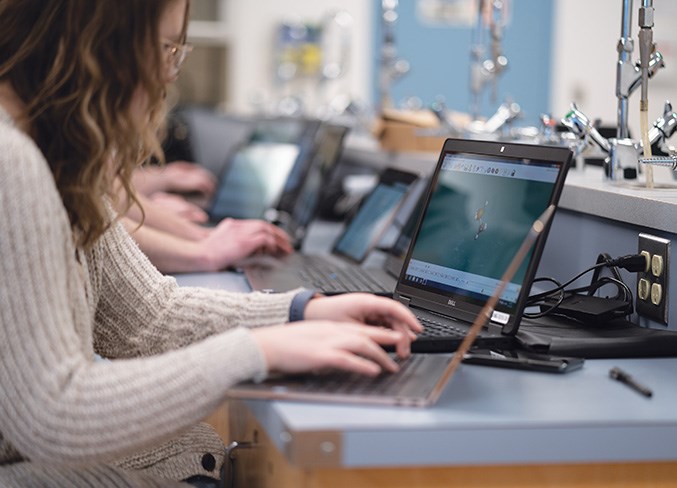It’s an ongoing challenge and expense to keep technology current in Holy Trinity Catholic School Division, which is why the organization hopes to achieve a sustainable four-year device replacement cycle.
The division has been addressing some of these challenges by replacing groups of Chromebook laptops each year, regularly updating classroom technology, and replacing its telephones since the current system is old and finding parts and support is difficult.
This year the division plans to upgrade the telephone system at Vanier Collegiate since it is 12 years old, while it also plans to enhance most schools’ intercom systems to ensure reliable public addresses.
To support a wide array of technology with two tech staff, Holy Trinity continues to work toward standardizing brands and models in schools.
Information about the division’s technology challenges and successes was contained in a mid-year report that the IT department presented during the recent board of education meeting.
Holy Trinity’s email is hosted online in the cloud and relies on Microsoft’s anti-spam and anti-phishing protection, the report said. In 2021, the division subscribed to another program that provides extra filtering of spam, phishing and malware.
Each month, the division blocks roughly 8,700 spam emails, 3,300 phishing emails, and 50 emails containing malware.
“This is within five per cent of our monthly average, which is expected as the number of new staff doesn’t fluctuate too much,” said the report.
Meanwhile, the division’s IT help desk received 1,795 requests from April 2022 to April 2023, compared to 1,987 requests in 2021-22 and 3,242 requests in 2020-21.
The division has 48 Windows desktops, 230 Windows laptops, six Apple computers, 39 SMART projectors, 76 75-inch TVs, 10 interactive TVs, 120 AirTame wireless devices, 58 printers, 170 iPads and 1,865 Chromebooks.
The IT department maintains the division’s existing devices and replaces a portion each year, starting with the oldest units, the report said. It has been replacing one-quarter of its embedded Chromebooks each year — 340 units — while the remaining units belong to the Vanier one-to-one program.
Furthermore, the division continues to replace its classroom SMART projector/touch boards with TVs and is three-quarters of the way finished. The department is also working with the buildings department to mount TVs on walls when classroom renovations occur.
Moreover, the department has installed 10 interactive touch TVs in its K-3 classrooms — the rollout continues — and has received plenty of positive feedback, the report continued.
“The increased density of devices in the classroom has prompted the IT department to increase wireless connection coverage,” the document noted. “We have begun installing WiFi 6 access points, which boast increased coverage and speed for our classroom technology.”
To protect daily activities, the organization purchased a natural gas generator for the division office to keep local services, internet, and phone systems online during an extended power outage in Moose Jaw. Division staff tests the generator weekly to ensure it works.
The IT department maintains data backups for all critical services, while staff and student data is backed up at the division office and replicated at Vanier. It also retains several weeks’ worth of backups to restore older copies of data if necessary.
With physical security, the department has been installing security cameras in schools over the years —70 have been installed so far. In some schools, the cameras monitor the front doors because the office is not near the main entrance. In other schools, the cameras monitor parking lots, outdoor areas, hallways and commons areas.
Holy Trinity created a new protocol during the pandemic by having schools lock their front doors, the report added. The IT department installed intercom systems with cameras and remote door locks in Moose Jaw elementary schools to let offices remotely allow visitors into the building.
The next Holy Trinity board meeting is Monday, May 15.




